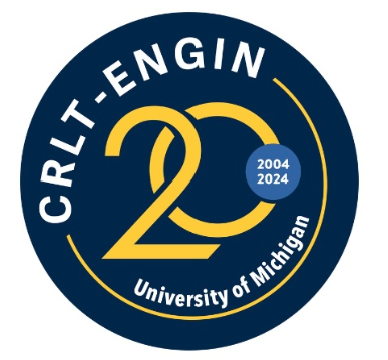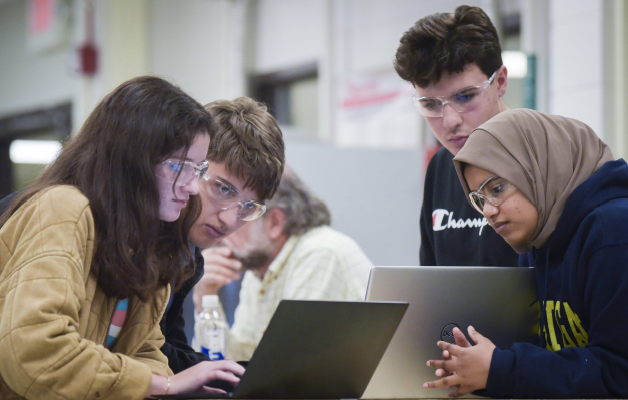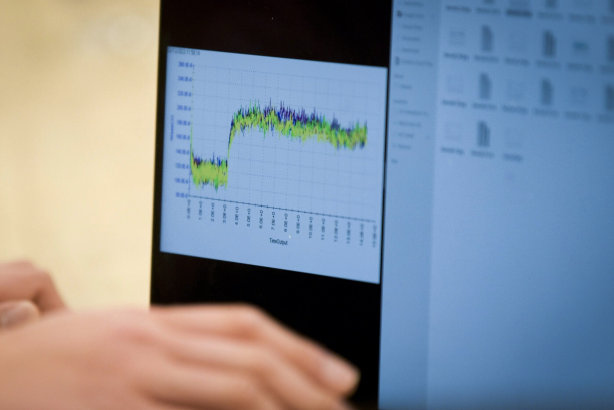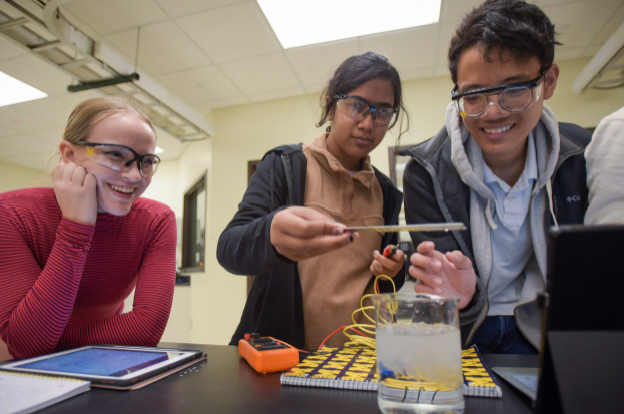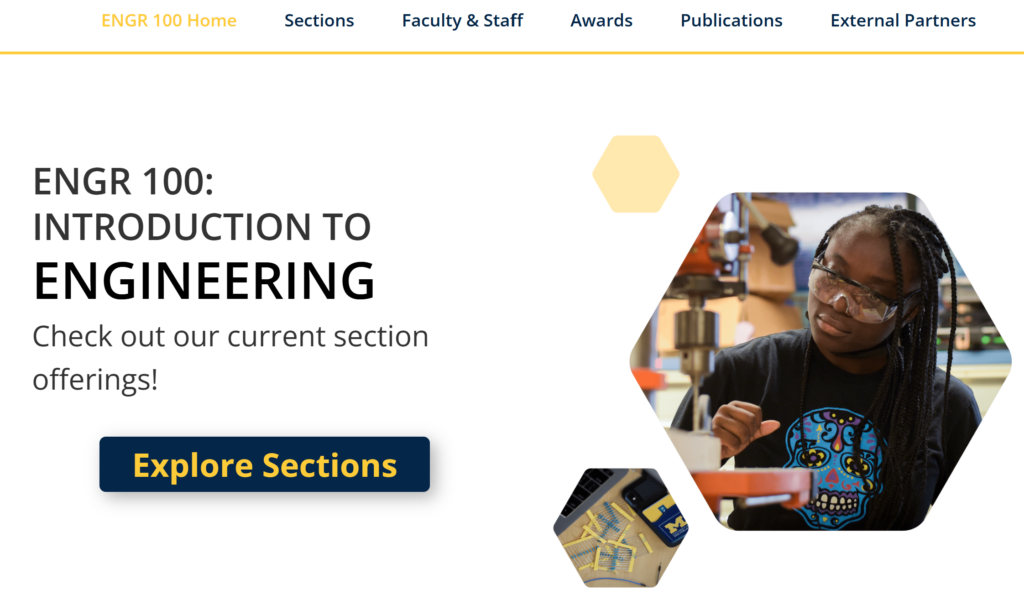April 2025
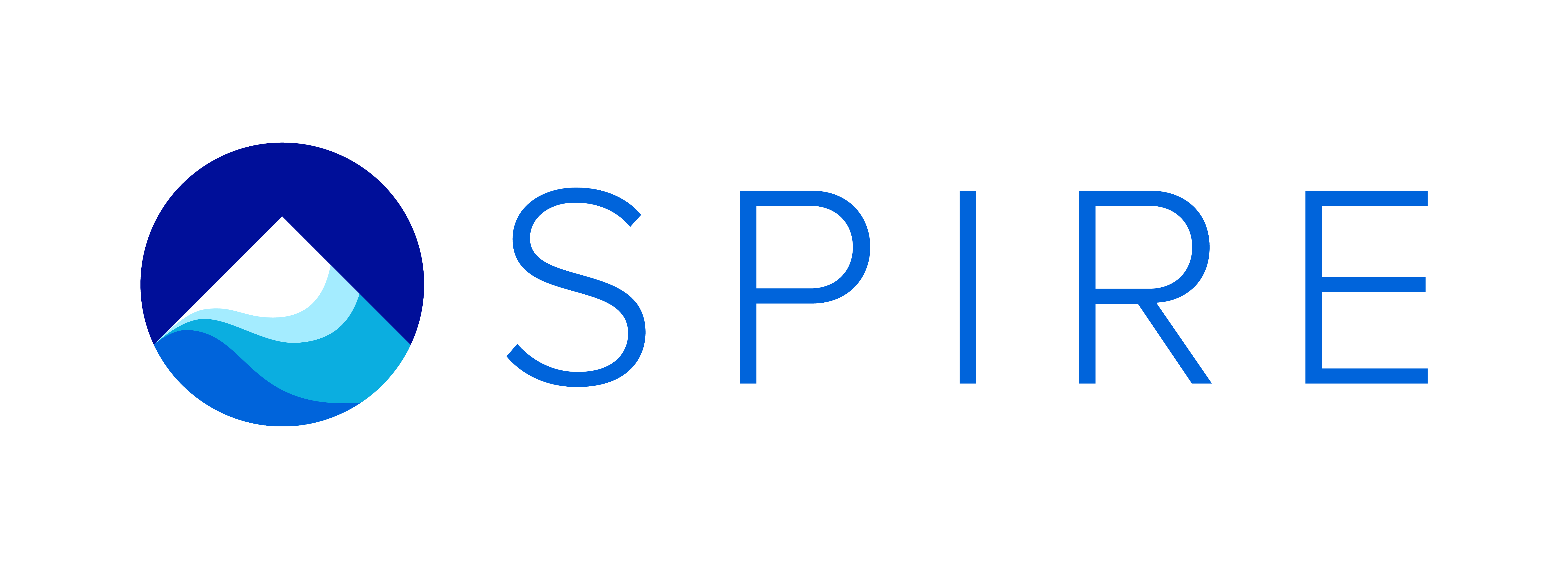
The April feature provides information on some key updates to Spire.
We developed Spire several years ago in collaboration with the U-M Center for Academic Innovation to support students in the development of professional competencies. Currently, nearly 4,000 Michigan Engineering students have been onboarded to Spire, with 56% having planned at least one engaged learning opportunity that will support their development of a professional competency (teamwork, leadership, communication, etc.). Monthly student engagement in Spire has more than doubled as students reflect on their experiences and earn level ups and recognition for their work.

Example of promotional materials we’ve developed to broadly promote Spire. Follow @ Immersed_Engin![]()
Course Integration
Over the past year we have developed opportunities for instructors to integrate Spire into their courses. Building on a pilot with EECS 200 and 300 last winter term, faculty from 8 diverse courses – ranging from EECS and Robotics to Technical Communication and Engineering Across Cultures – identified the competency skills students gain in class and integrated automatic leveling on Spire based on course grades. Nearly 400 students have advanced to the second level of the selected competency dimensions resulting in nearly 1400 level ups, with many continuing to engage with Spire beyond their classes.
LinkedIn Credential
In partnership with other campus partners (Ross and SPH), we recently implemented a credentialing system that allows students to promote their accomplishments as part of their LinkedIn profile. In February, Sierra Kammerer became the first CoE student to earn a LinkedIn credential.
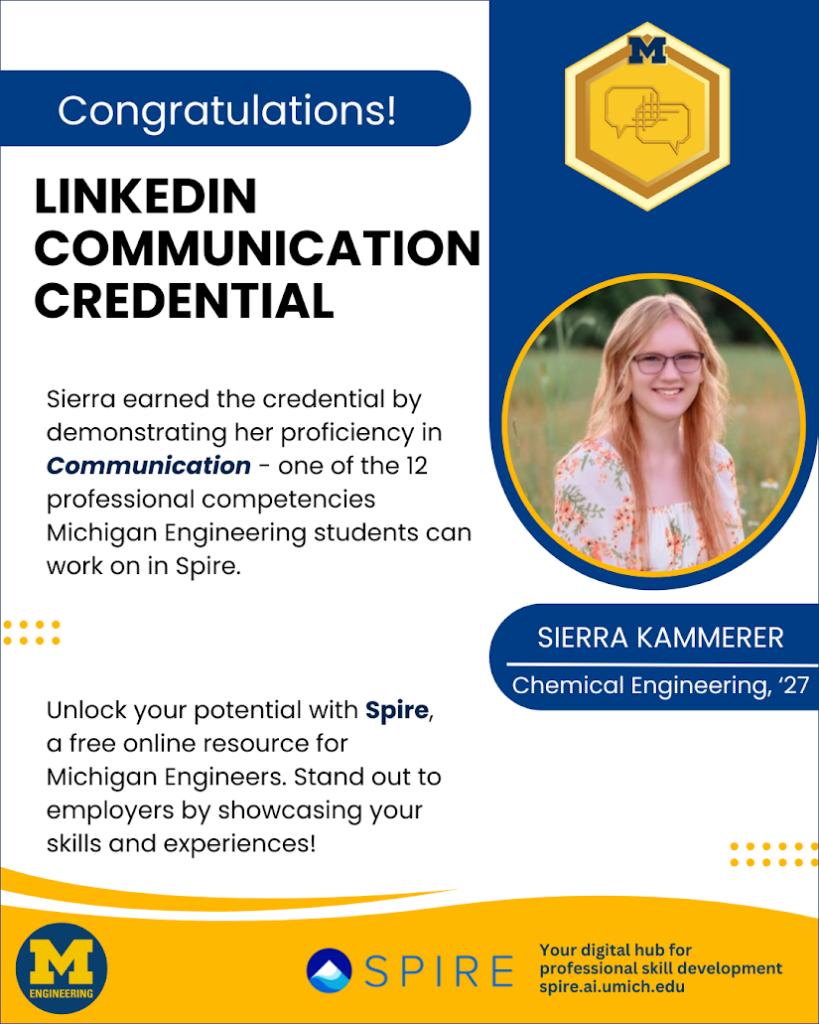
What’s Next?
- Continue to work on design elements in Spire to support the student experience.
- Expand course integration efforts.
- Utilize Spire to support work with the Michigan Engineering Leadership Center.
- Got an idea? Let us know!
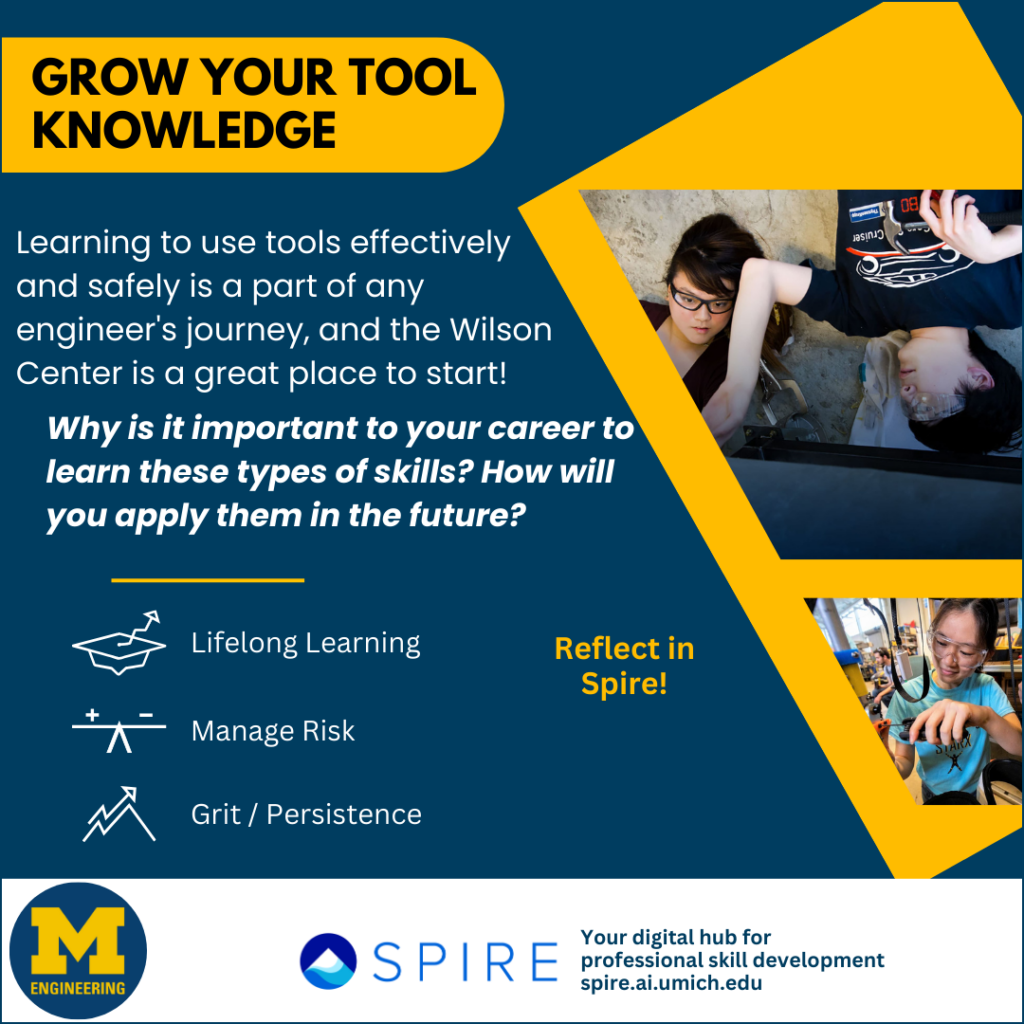

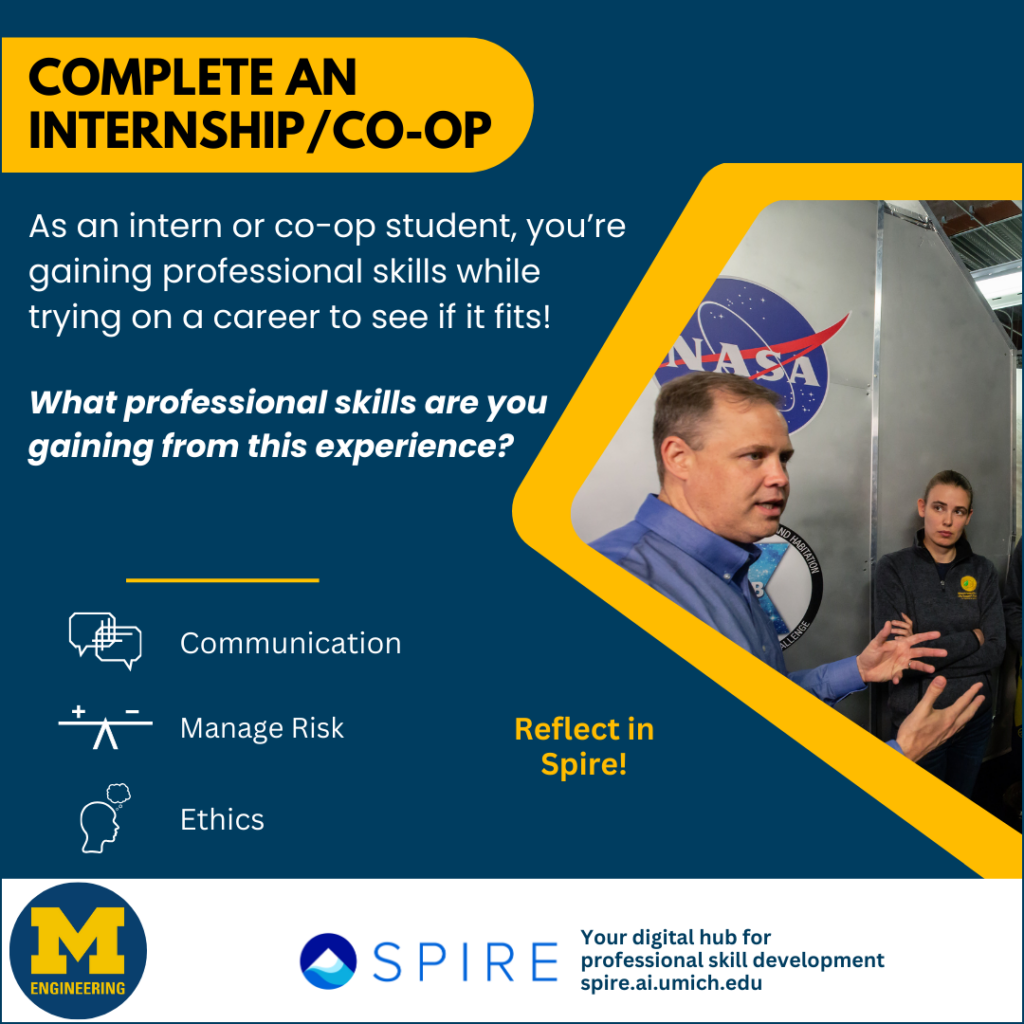
For more information , here’s a program overview slide deck with additional information and metrics. You can also reach out to Laurie Sutch, Spire Program Manager, with questions or ideas, [email protected].
March 2025

Program Mission and Focus
The Engineering Advising Center (EAC) provides academic services and support for the College of Engineering’s (CoE) first-year and undeclared students. Services include academic advising, major/career exploration, goal setting, and workshops to facilitate student success. Through these services, the office empowers new undergraduate students to take ownership of their academic and personal development, connect with resources and opportunities, and transition successfully into the Michigan Engineering community.
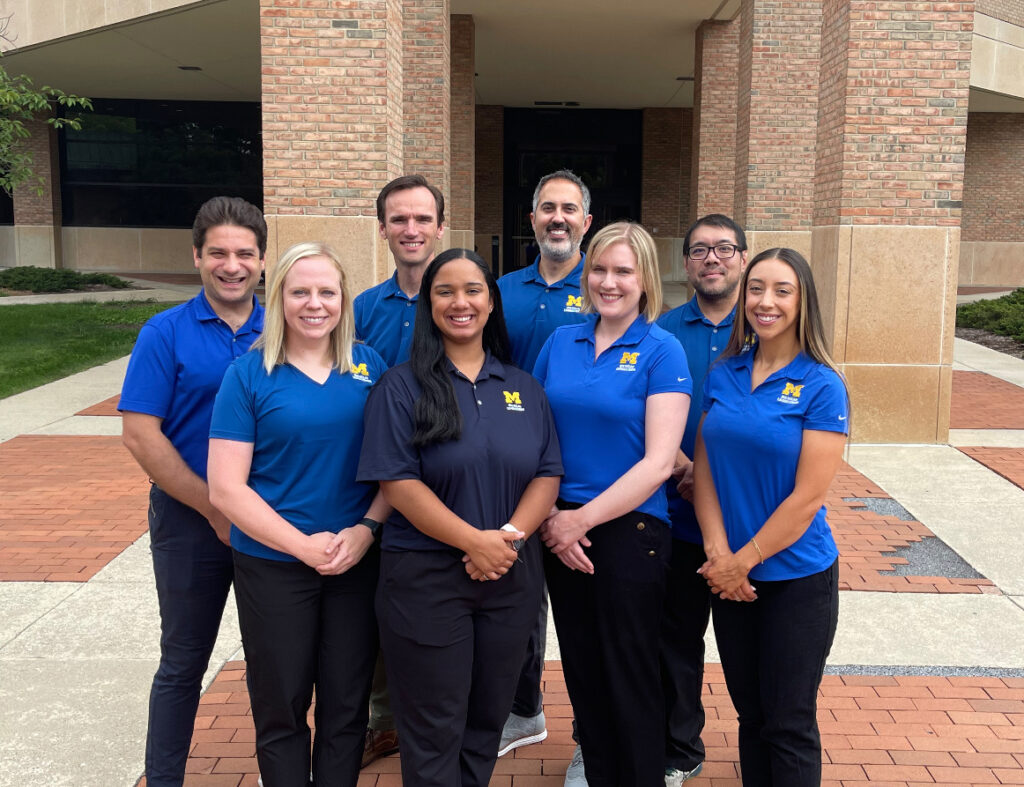
The EAC Team as of September 2024. Not pictured are our two advisors hired in November 2024, Jordan Ross and Alyssa Cozad.
History
Academic advising for first-year students has existed in the CoE for several decades. Early iterations of the office leaned on a mix of faculty and staff members to provide advising. In 1996, the office gained its current name: Engineering Advising Center. By the early-2010’s, the EAC shifted primarily to staff advising.
Today, the EAC hosts the CoE Peer Mentor Program (PMP), Michigan Engineering Transfer Support (METS), and the 1st Gen Engin programs to further build community and support students transitioning into the College of Engineering.
The EAC continues to evolve to meet student needs. Today, we leverage early-alert tools, such as Advising ECoach, to identify students who may be struggling based on Canvas gradebook data. In the summer of 2024, we created an Orientation Maizey AI tool to assist students with the orientation process.

EAC Advisor, Frankie Quasarano, advises a student.
Key Metrics
Summer Orientation is a busy time for the EAC. In the summer of 2023, we provided 1 on 1 advising for 1544 incoming first-year students, and coordinated the transfer orientation experience for 251 external transfer students. Between these two orientation experiences and information sessions for cross campus transfer students, the EAC offers support for every undergraduate Engineering student entering the College. In the 2023-24 Academic Year, EAC advisors provided 2,534 student appointments and held 1,524 virtual drop-in meetings. During Fall 2023, 71% of first-year students met with an EAC advisor in their first term.
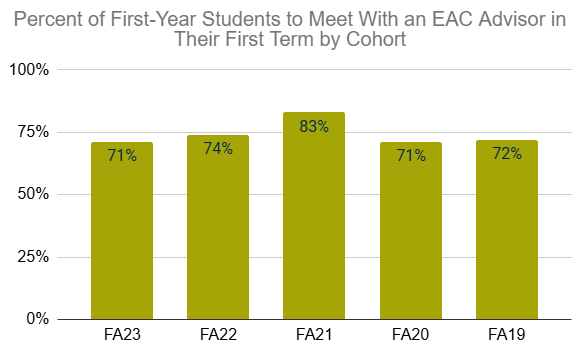
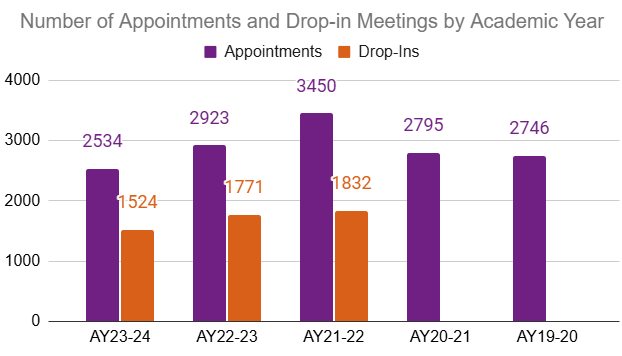
Beyond advising, we offer a variety of events each year to support students and build community. Those events include kickoffs for PMP and 1st Gen Engin, and a semi-annual EnginConnection event for transfer students. In recent years, our funded programs have held events at the Yost Ice Arena, Pinball Pete’s, and Michigan Stadium. We plan the CoE Majors and Minors Fair each fall to bring together students and representatives from a variety of departments within and outside of the College of Engineering.
Key Goals for the Future
Looking ahead, the EAC seeks to further establish connections with the students it serves – allowing us to progress beyond a transactional discussion of degree requirements and into more meaningful, holistic conversations. Toward this end, we’ve rearranged our approach for 2025 Summer Orientation to allow for longer 1 on 1 advising interactions between incoming students and their advisors. This fall, we will expand upon a Fall 2024 pilot project to proactively engage with students who haven’t connected with their EAC advisor since summer orientation.
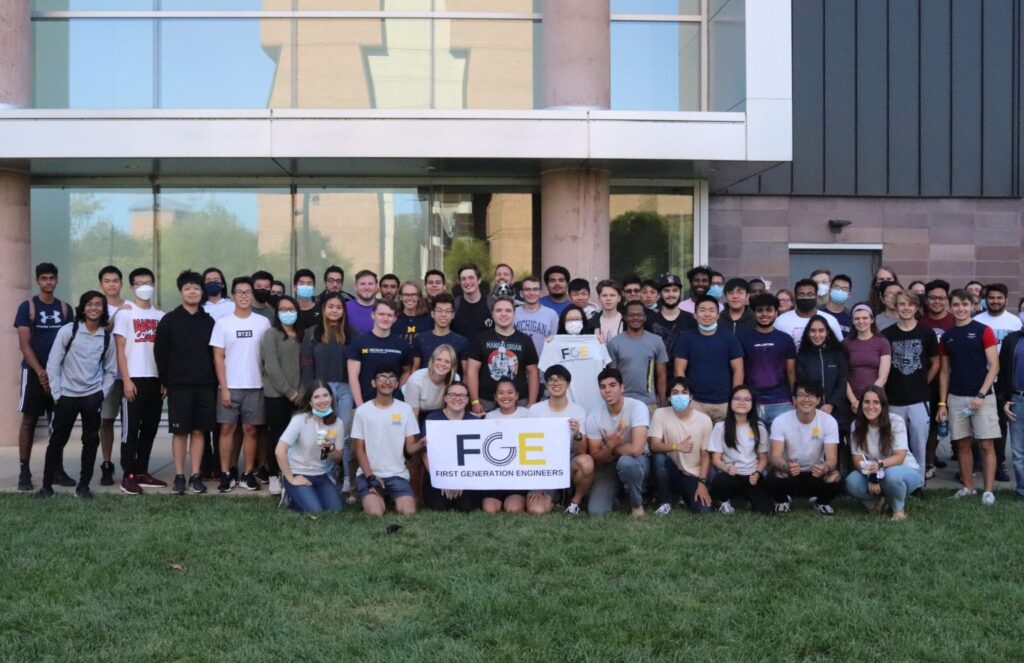

Left: 1st Gen Engin participants. Right: Peer Mentor Program event.
To learn more about our team and the support we provide, please visit: advising.engin.umich.edu
February 2025

Program Mission and Focus
The Center for Socially Engaged Engineering and Design (C-SED) at the University of Michigan is a unique hub for educating engineers to integrate people-focused and contextual aspects into their work. It is the only global education center dedicated to developing and delivering sociotechnical content for engineers, creating real-world-contextualized learning experiences with students and instructors and continually refining these learning experiences through research and assessment. The center’s mission is ambitious: to make socially engaged engineering and design (SEED) a standard part of engineering education worldwide. By blending technical rigor with societal context, C-SED equips future engineers to better understand the human, cultural, and ethical dimensions of their work.

A graphical representation of C-SED library of educational content that features sessions on Engineering & Design Skills and Microhistorical Case Studies – representing the “How” and the “Why” of Socially Engaged Engineering & Design
History
C-SED was co-founded in 2016 by Professors Steve Skerlos, Kathleen Sienko, and Shanna Daly to champion a people-first approach to engineering design. In its early years, the center primarily provided consultative support for co-curricular student design teams, helping incorporate social considerations into projects outside the classroom. In 2018, C-SED expanded its focus to develop original programs and to support instructors in integrating socially engaged engineering concepts into their courses. Since then, the center has gained national recognition as a leader in sociotechnical integration and innovative engineering education, influencing peer institutions and setting new, more comprehensive standards for how engineers are trained.
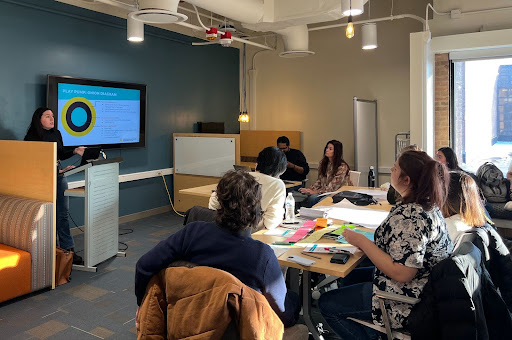
C-SED Graduate Facilitator Lauren Wojciechowski runs a stakeholder mapping activity for students in Professor DJ Jain’s EECS 495: Accessible Computing, a partner course hosted in C-SED’s Collaboration Space.

The C-SED Lab offers space for courses and co-curricular design teams like BLUElab and M-HEAL to develop and refine physical prototypes. Trainings and workshops in basic making and building techniques like working with wood, 3D printing, electronics, and sewing & embroidery are also offered.
Key Metrics
The impact of C-SED’s work is evident in its growing reach across campus and beyond. In Academic Year 2023 – 2024, there were 8,452 total interactions with students through C-SED courses, workshops, and training programs. Over the same period, C-SED supported 94 instructors (from engineering and non-engineering fields) in bringing socially engaged engineering and design content into their teaching, including partners at 6 external institutions. The program also facilitated 141 Design Skills sessions and SEED Microhistory sessions (learning modules contextualized by case examples of sociotechnical engineering work), and expanded its support to 14 engineering departments. These metrics underscore C-SED’s rapid growth and its success in infusing SEED principles throughout the curriculum and co-curriculum.


Future Goals
Looking ahead, C-SED is focused on deepening its curricular integration and broadening its influence. One key goal is to embed its proven SEED sessions into structured curricular threads and scaffolds within degree programs, beginning with pilot efforts in Mechanical Engineering and Biomedical Engineering. The center is also expanding its role in leadership and entrepreneurial skills by collaborating with the new Michigan Engineering Leadership Center, ensuring that future tech innovators and leaders are equipped with sociotechnical perspectives. Perhaps most ambitiously, C-SED is scaling up its instructor and facilitator training programs to support peer institutions—laying the groundwork for a long-term vision of establishing a National Institute for Sociotechnical Engineering Education. Through these initiatives, C-SED aims to make socially engaged engineering not just an ideal, but a universally practiced pillar of engineering education.
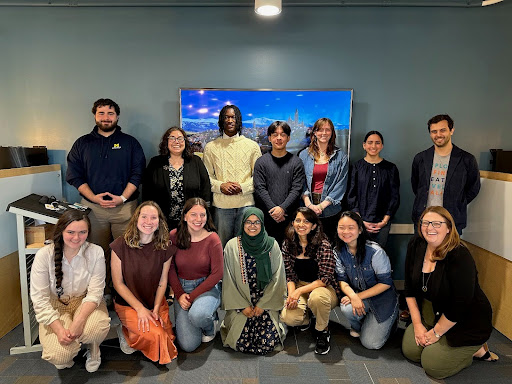
Students and instructors of C-SED’s project based Socially Engaged Engineering & Design course after final course presentations in Winter ‘24.
January 2025

The Program Feature this month will focus on one of our new initiatives that is in development – the Michigan Engineering Leadership Center.
BACKGROUND
Last academic year, a committee met to consider the creation of Leadership Center that could serve all Michigan Engineering Students. ADUE Kevin Pipe charged the group to:
- Benchmark leadership programs/centers at UM and peer institutions
- Create a strategic plan to establish the Michigan Engineering Leadership Center. Include vision, mission, organizational structure, financial plan, defined metrics for outcomes-based assessment, and other recommendations for implementation. Among other priorities defined by the committee, the plan should:
- Facilitate strong interactions between the Center and academic departments / faculty
- Provide sufficient scalability to impact every CoE student so that leadership development facilitated by the center is a defining feature of a Michigan Engineering education
- Leverage and consider adaptation of existing CoE leadership development offerings (Honors & Engagement programs, CoE student organization support structures, etc.)
- Consider ways to leverage the CoE Experiential Learning Framework
- Consider the differing needs of undergraduate, Master’s, and Ph.D. students
- Consider incorporation of people-first approach to engineering
- Make a recommendation regarding the creation of an academic minor or other credential (e.g., leadership certificate).
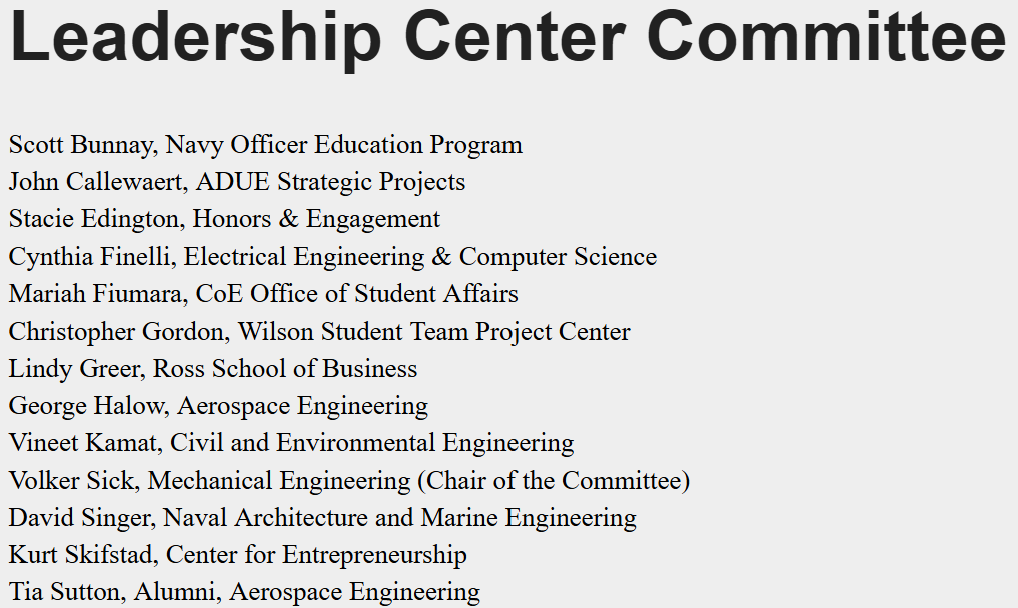
MISSION and VISION
The committee noted there is an opportunity to substantially enrich students’ learning experience by providing more structured education on leadership and to connect and coordinate the large number of related activities, organizations, and offices across CoE. To that end, the committee developed an initial vision, mission and set of assumptions to guide the development of the Michigan Engineering Leadership Center.
Vision:
Our graduates are empowered people-first engineering leaders that serve the common good.
Mission:
Developing student leadership skills (including leading oneself, peers, and teams) through personalized roadmaps which integrate evidence-based transformational experiences (inside and outside the classroom), cutting-edge content, reflection, and coaching.
Assumptions:
- Leadership is defined as a set of skills and behaviors used to help people align their collective direction, to execute strategic plans, and to continually improve an organization.
- Leadership comprises skills and behaviors that anyone can learn.
- Every CoE student can benefit significantly from developing leadership skills,within an engineering context, as well as increasing their capacity to lead more broadly. Leadership development should not be limited to those who might be expected to hold positions of authority now or in the future.
- Leadership development occurs at three levels: self, peers and teams, and organizations. CoE students need to be supported in the development of skills at all three levels.
Link to Executive Summary from the Leadership Center Committee Report

As programming is developed, the Center will leverage the Michigan Model of Leadership, current CoE leadership initiatives, strategies and resources developed as part of the Experiential Learning Framework such as Spire, as well as other leadership principles of particular relevance to engineers. The Michigan Model of Leadership was selected as a foundational evidence-based core of the Michigan Engineering Leadership Center with the added benefit of expanding a U-M-wide branding in leadership. The model provides a framework to understand which leadership skills students have already developed well and which skills they need to improve. Some additional information on the model is provided below:

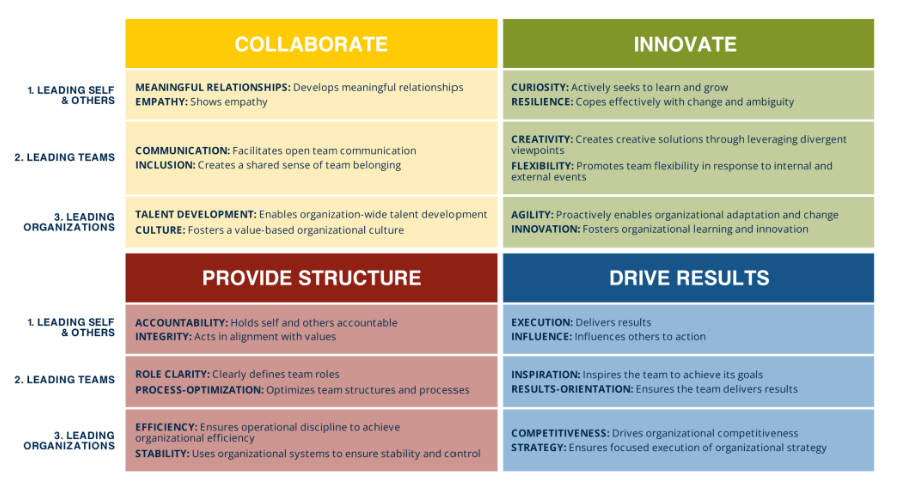
WHAT’S NEXT?
Last summer the College provided funding to hire an inaugural executive director for the Leadership Center. The director will guide the overall strategic planning and implementation, policy development, organizational development, and resource allocation (fiscal, administrative, and staff) for the Center. That posting closed on January 7 and a search committee is reviewing applications with the goal to have finalists on campus for visits later this semester. CoE Advancement and Communications & Marketing are also supporting the launch of the Center by creating materials to inform fundraising for additional positions such as a faculty director, a professor of practice, programming and student support.
Be sure to watch for updates and presentation invites for the Executive Director search.
November 2024
First Year Program
Program Mission
The First Year Program (FYP) is a collection of courses, programs, and resources available for first year engineering students to make a smooth transition from high school to college, connect to the College community, explore academic programs, and chart a path to success. There are four courses included in the program: ENGR 100 (Introduction to Engineering), ENGR 101 (Introduction to Computers and Programming), ENGR 151 (Accelerated Introduction to Computers and Programming), and ENGR 110 (Design Your Engineering Experience).

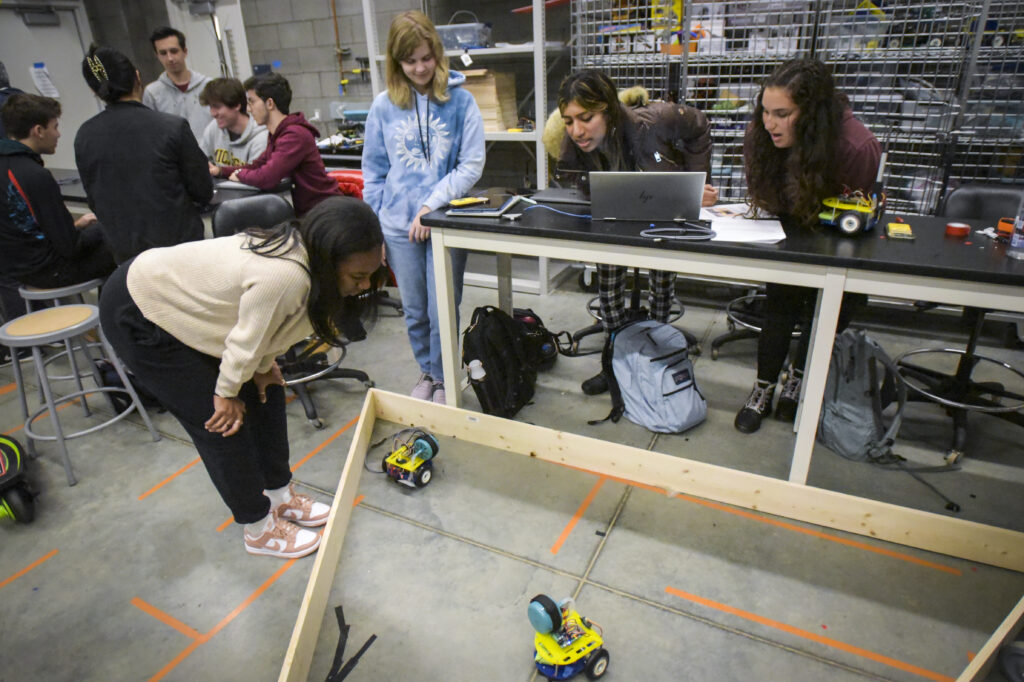
Left: ENGR 100.600 students work on building the frame for their remotely operated underwater vehicle. Right: ENGR 100.850 students work on testing the functionality of their robots in a confined space.
History
The beginning of the FYP dates back to spring of 1997 when the College of Engineering’s plan for curriculum reform, Michigan Curriculum 2000, recommended that the college offer a new course for FY students called ENGR 100 beginning in Fall 1997. ENGR 101 was approved to start at the same time. ENGR 110 was approved in spring 2004 and was offered for the first time in Fall 2004. This two credit elective course originally began as a way to help students choose a major. It has evolved over the years to give students an opportunity to explore all that Michigan Engineering has to offer from majors and career paths to extra and co-curricular activities. Due to an increase in the diversity of first year students’ programming skills, the college launched ENGR 151 in 2009. These courses, along with dedicated academic advising from the Engineering Advising Center, the Common Reading Experience, and a host of other support services now encompass the FYP and the first year engineering student experience.
Current Focus/Objectives
Our current Director of Academic Programs, Rachael Schmedlen, joined us in the Fall of 2021. During her tenure, she has focused on increasing the visibility of our faculty’s efforts through the establishment of the ENGR 100 Section of the Year Award and ENGR 100 section snapshots that are presented during our faculty meetings. She has worked to foster cohesion among the FY courses through spring faculty and staff retreats.
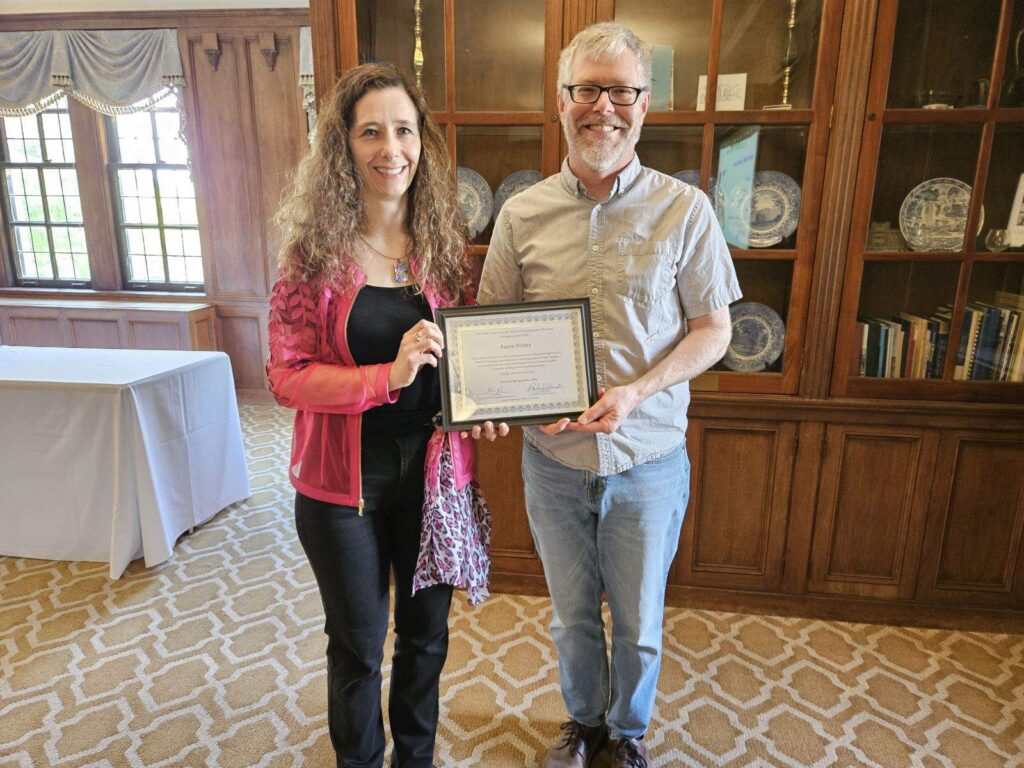
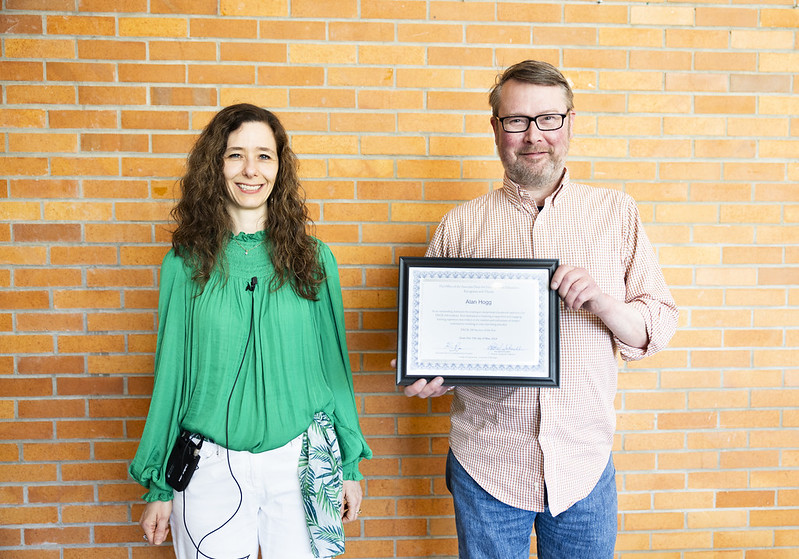
Rachael Schmedlen presents the 2024 ENGR 100 Section of the Year Award to ENGR 100.980 “Rocket Science” faculty – Aaron Ridley, Climate and Space Sciences and Engineering (left) and Alan Hogg, Program in Technical Communication (right).
A major project initiated by Rachael was the redesign of our ENGR 100 web page, which began in 2022. The goal was to better highlight the E100 section choices by adding short videos, photos, and a consistent description format. The website also provides a list of publications and presentations on pedagogy and engineering education research in E100 from our faculty.
Key Metrics
During the 2023-2024 academic year, ENGR 100, 101, and 151 served roughly 1525 FY students and over half of them elected to take ENGR 110. In the ENGR 100 course, we had 31 technical faculty representing 13 majors, including sections from ADUE (a non-major specific section applicable to most engineering disciplines) and UARTS (an E100 section for Living Arts students). We had roughly 25 Technical Communications faculty co-teach ENGR 100 with our technical faculty. Our FYP faculty also won the ADUE Teaching Awards for the 2023-2024 academic year.
- Frank Marsik won the ADUE Individual Teaching Award for ENGR 110.
- The ENGR 100.850 Robotics Mechanisms instructional team, consisting of faculty Derrick Yeo, Greg Formosa, Kelly Bowker, Nabilah Khachab, Mariel Krupansky and IAs Julie Wu, Gabriela Lopez-Salgado, Thomas Cuddy, Deborah George, Karis Hu, Lani Quach, won the ADUE Team Teaching Award.
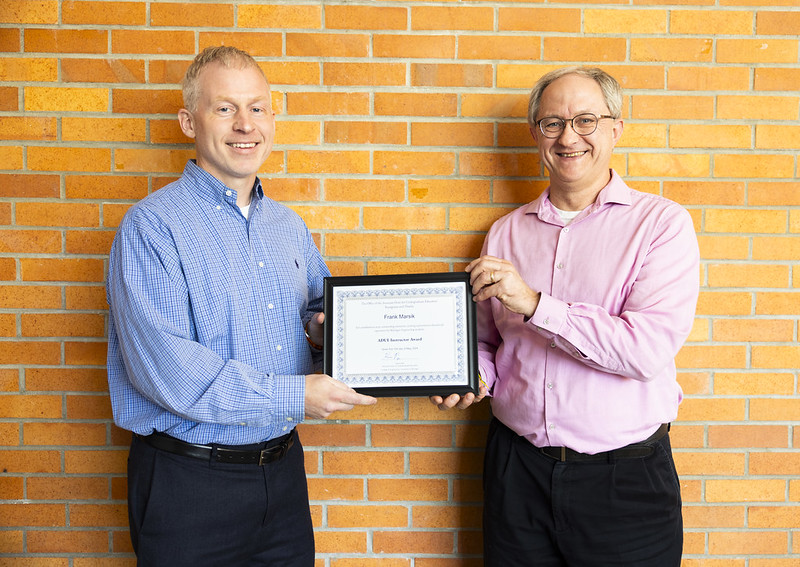
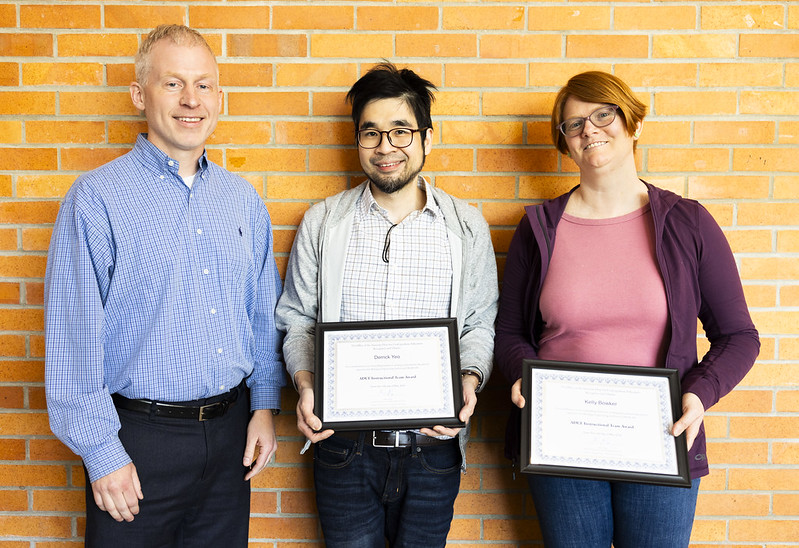
Kevin Pipe presents the ADUE Individual Teaching Award to Frank Marsik, Climate and Space Sciences and Engineering (left) and the ADUE Team Teaching Award to Derrick Yeo, Robotics and Kelly Bowker, Program in Technical Communication (right).
Key Goals for the Future
As we look to the future, the FYP is planning for a more cohesive and comprehensive approach to supporting first year students through facilities, coordination of services, and communication with other areas involved with FY students, such as advising, academic success, and student experience. In addition, ENGR 100 is beginning the three-year Foundational Course Initiative process (FCI) to better understand how the design process, technical communication, teamwork, and professional and ethical values are being taught across sections to identify ways to support ENGR faculty and enhance student learning.
October 2024

Rather than featuring one of our awesome programs, this month we are providing some highlights from the ADUE staff professional development survey that was distributed earlier this year. Many thanks to ADUE staff who took the time to share their input via the survey.
Executive Summary
The report presents the results of the Professional Development (PD) survey conducted among ADUE staff to assess employee satisfaction, career advancement opportunities, and the accessibility and effectiveness of professional development resources within the organization. The survey, conducted from July 1 to July 19, 2024, using the Qualtrics platform, received 44 complete responses, resulting in a 66.6% response rate. The findings offer valuable insights into the workforce’s perceptions and needs as it is related to the professional development training, highlighting areas for improvement and potential strategies for enhancing employee engagement and development.
Employee Satisfaction and Career Advancement:
The survey results indicate that a significant portion of employees are relatively satisfied with their current positions, with 44.44% reporting they are “somewhat satisfied” and 35.56% “very satisfied.” However, there is room for improvement as some employees expressed neutral or negative sentiments. The survey also revealed that while 40% of employees have a clear career advancement plan, a notable percentage are unsure or lack a plan altogether, suggesting a need for more structured guidance and support in this area.
Importance and Accessibility of Professional Development:
Professional development is highly valued among employees, with 52.27% considering it essential for career growth. While most employees feel their current job provides opportunities for professional development, there are concerns about the accessibility and availability of these resources, particularly in relation to financial and time constraints. The report highlights the importance of addressing these barriers to ensure all employees can easily access the development opportunities they need.
Tenure-Based Variations in Perceptions:
The analysis of survey responses by tenure reveals significant differences in how employees perceive professional development opportunities and their role in career advancement. Newer employees tend to place a higher importance on professional development, while long-tenured employees are more confident in their ability to identify these opportunities. However, challenges remain across all tenure groups, particularly regarding barriers to access and the most effective types and timing of professional development activities.
Qualitative Insights and Opportunities for Growth:
The qualitative responses provide a deeper understanding of the diverse perspectives and concerns regarding professional development, career progression, and organizational culture. Key areas of focus include the need for more tailored leadership and management training, the importance of addressing structural issues in DEI initiatives, and the desire for more engaging and hands-on learning experiences. The responses also highlight the need for a more inclusive approach to professional development that recognizes informal learning opportunities and integrates professional development into performance reviews.
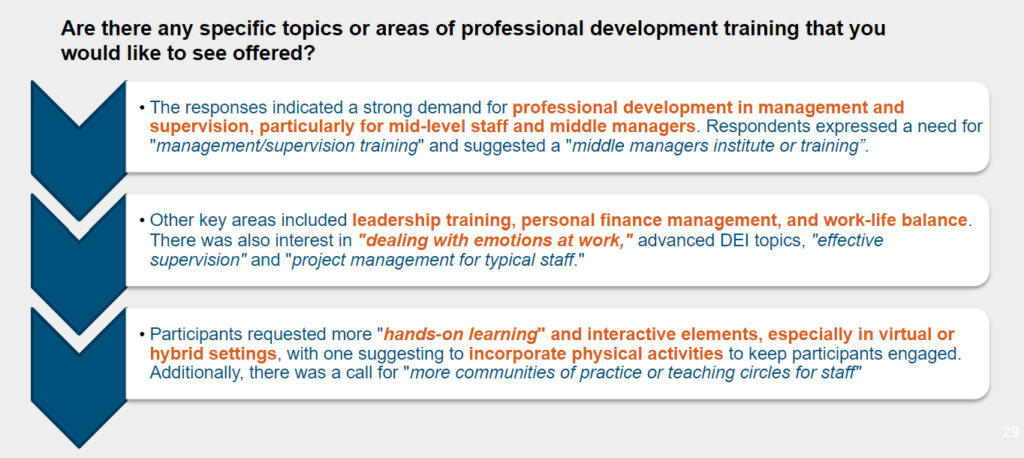
Overall, the survey results reveal a complex landscape of professional development needs and experiences within ADUE. While there are many positive aspects to the current professional development offerings, there are also significant gaps that need to be addressed. By implementing a more nuanced and comprehensive professional development strategy that aligns with the diverse needs and aspirations of the workforce, ADUE can enhance employee satisfaction, support career advancement, and foster a more engaged and productive work environment.

To address this last topic of pathways we have scheduled a Professional Development Journey session with Brian Cole from Organization Learning on Thursday, November 21 at 2:30. The session will cover a career development guide specifically intended to give ownership and resources to the individual staff member, along with a guide for managers to support their employees. The session will be held via Zoom and will be record. See the calendar invite for more information or contact Tara Smith ([email protected]) with questions. We will continue to identify other opportunities in the future that address topics and concerns identified through the survey.
Looking for more details about the survey results? Here are links to the full Report and Presentation. Many thanks to Victoria Osten, ADUE Program Evaluation Specialist, and her grad student assistant, Hiba Shoaib, for their work on the survey and report as well as the group that met last year to develop the survey that was initiated by Holly Taylor.
September 2024

The Center for Research on Learning and Teaching in Engineering (CRLT-Engin) represents a partnership between the College of Engineering and the Center for Research on Learning and Teaching (CRLT) on Central campus. Established in 2004, CRLT-Engin promotes evidence-based practices in engineering education so that students and instructors from diverse backgrounds and social identities can learn and thrive. By working with individuals, departments, and the College, we cultivate a strong community of engineering educators who strive for excellence in teaching, and innovate in teaching-learning environments.
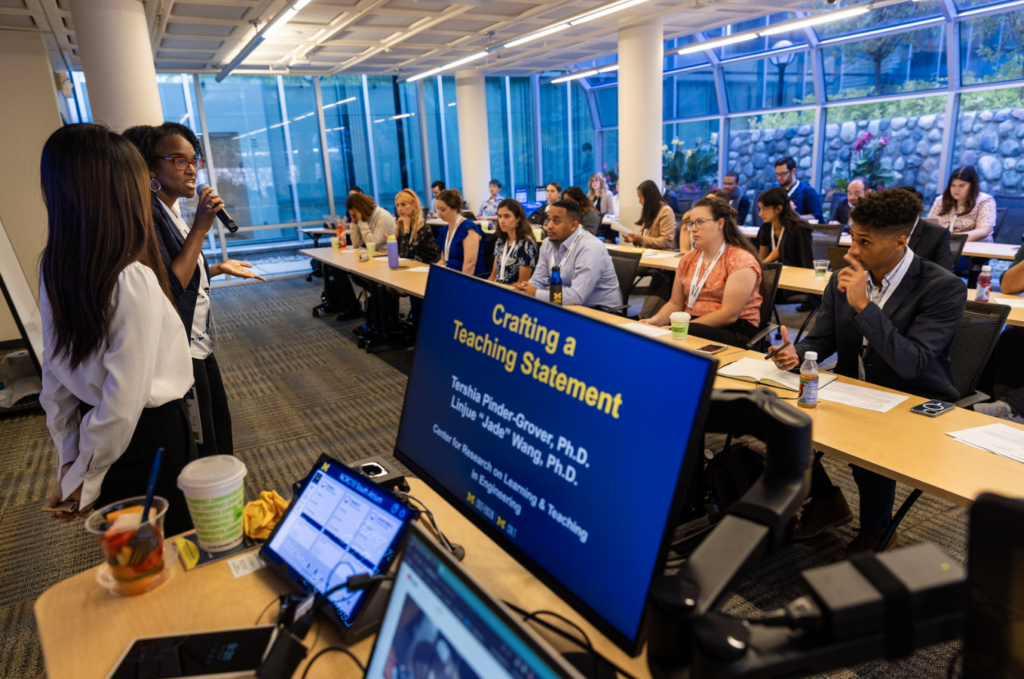
The goals of our center are to:
- Elevate the culture of teaching & learning in the CoE
- Integrate equity considerations in all CRLT-Engin endeavors
- Leverage collaborations with other units/departments to maximize impactful changes related to teaching and learning at the CoE
- Develop and maintain quality, modular, up-to-date resources for teaching
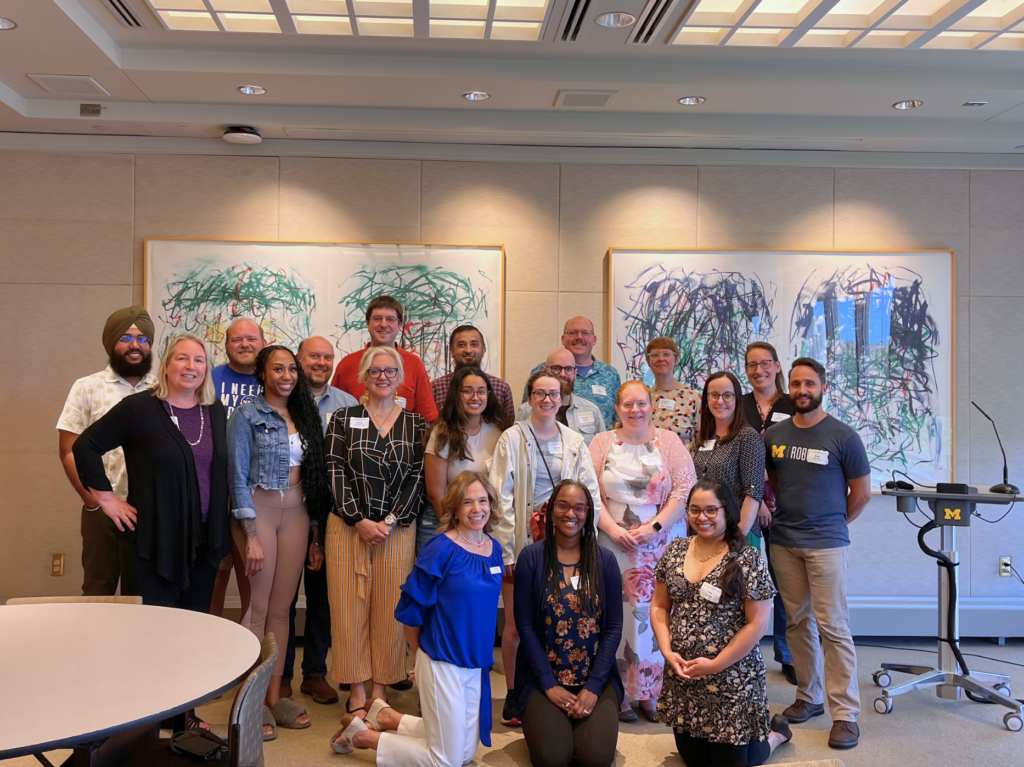
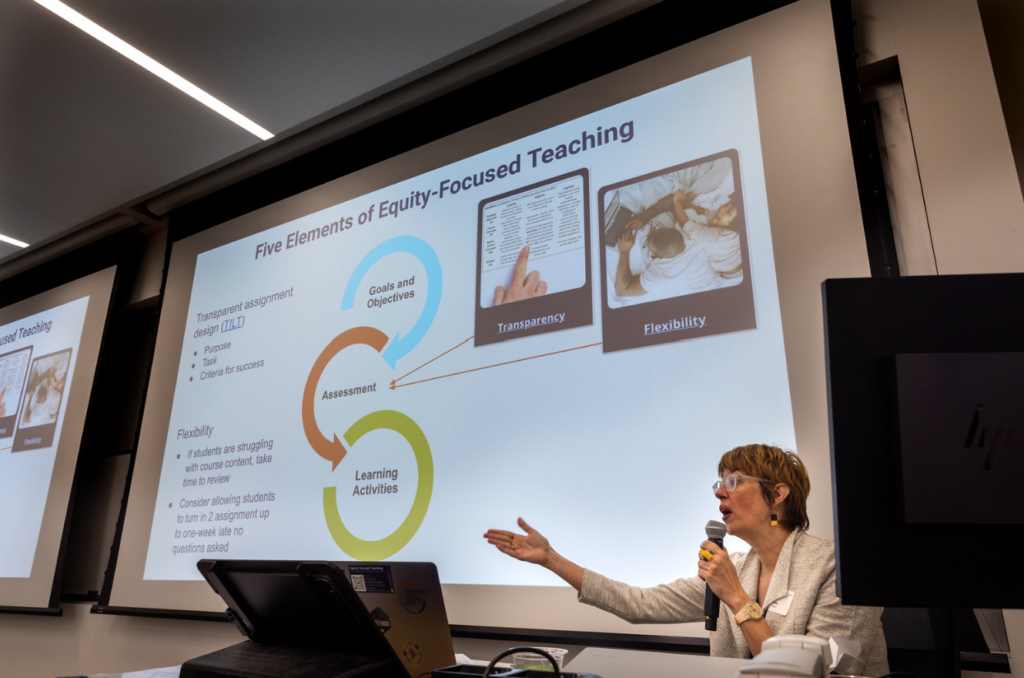
Left: Grenmarie Agresar, Associate Director for Strategic Initiatives, Tershia Pinder-Grover, Director, and Paty Jaimes, Assistant Director for Diversity, Equity & Inclusion in CRLT-Engin (first row), pose with faculty and graduate students who participated in the Equity-Centered Engineering Teaching Circle in May 2024. Right: Audra Baleisis, Associate Director for Core Programs in CRLT-Engin, facilitates a “Preparing to Teach Engineering Courses” workshop during the Michigan Engineering New Faculty Orientation. Photo: Marcin Szczepanski/Michigan Engineering
Our consultants work with instructors, departments, and administrators on a variety of teaching-related topics and issues. One of our biggest programs is our Teaching Orientations, which supports new engineering faculty and student instructors. Some of the other services we provide include individual consultations, workshops, learning communities, and customized programming for departments and units.
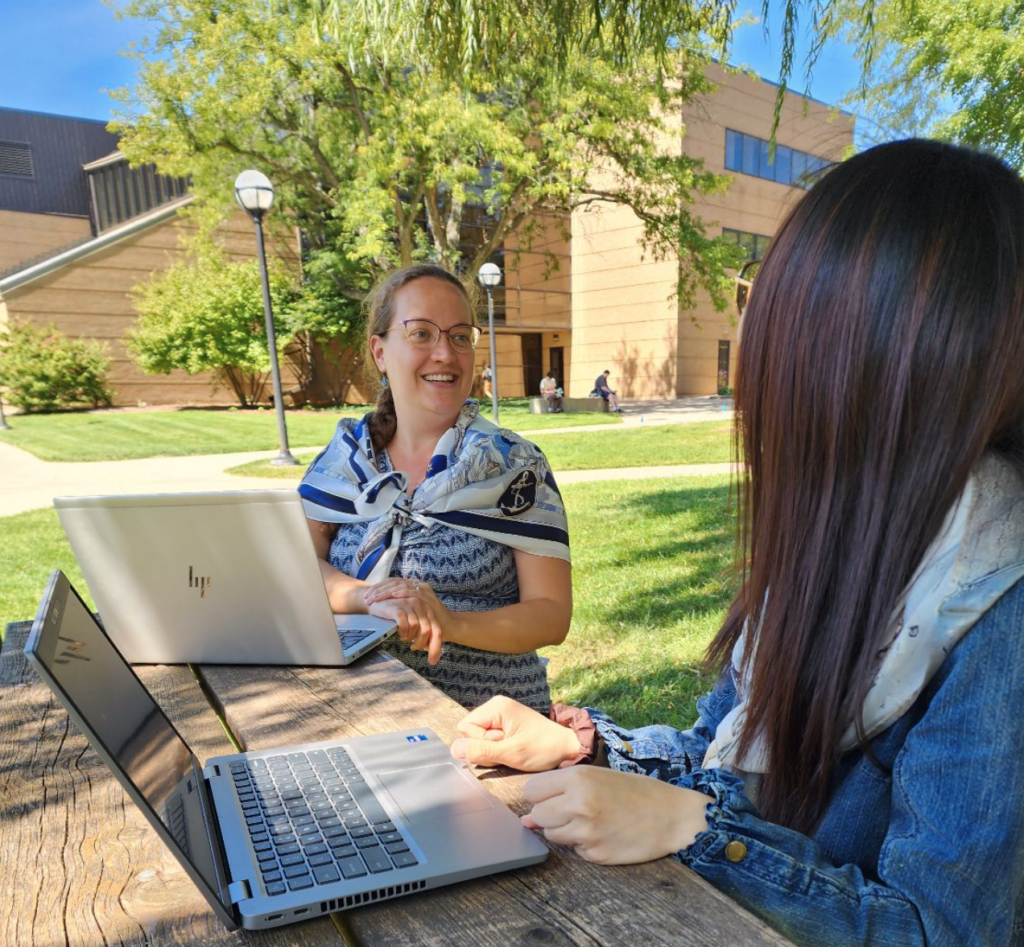
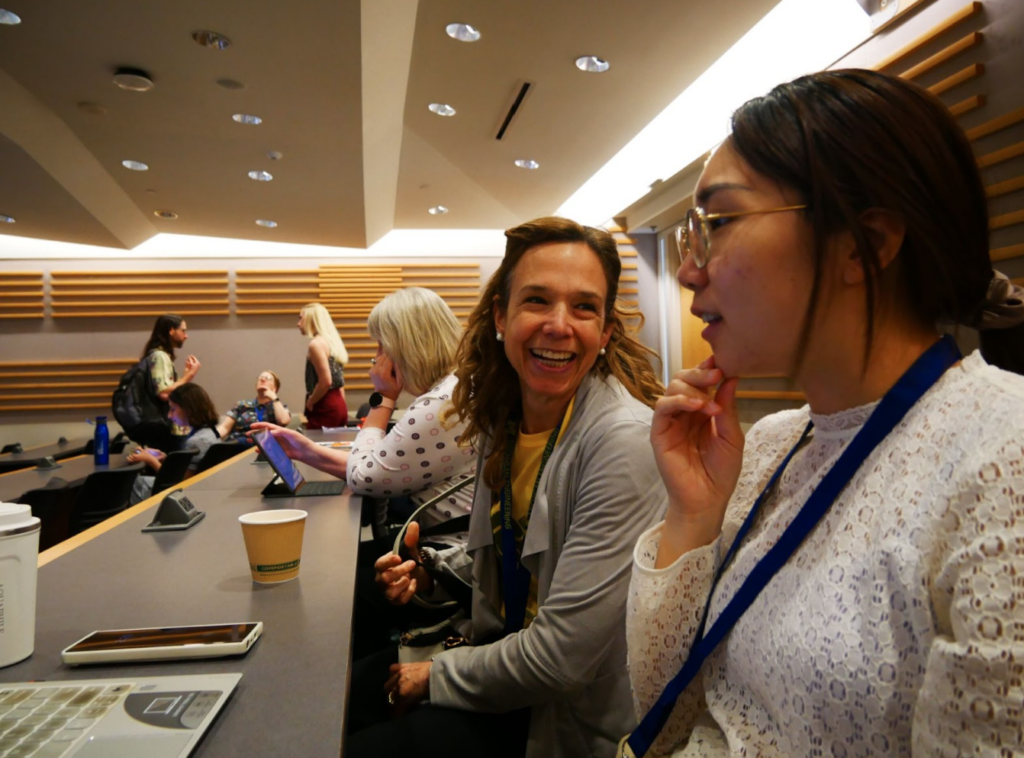
In the 2023 – 2024 academic year we connected with:
- 1,576 unique individuals across our center’s programs and services
- 2,510 event attendees
- 995 one-on-one consultation services
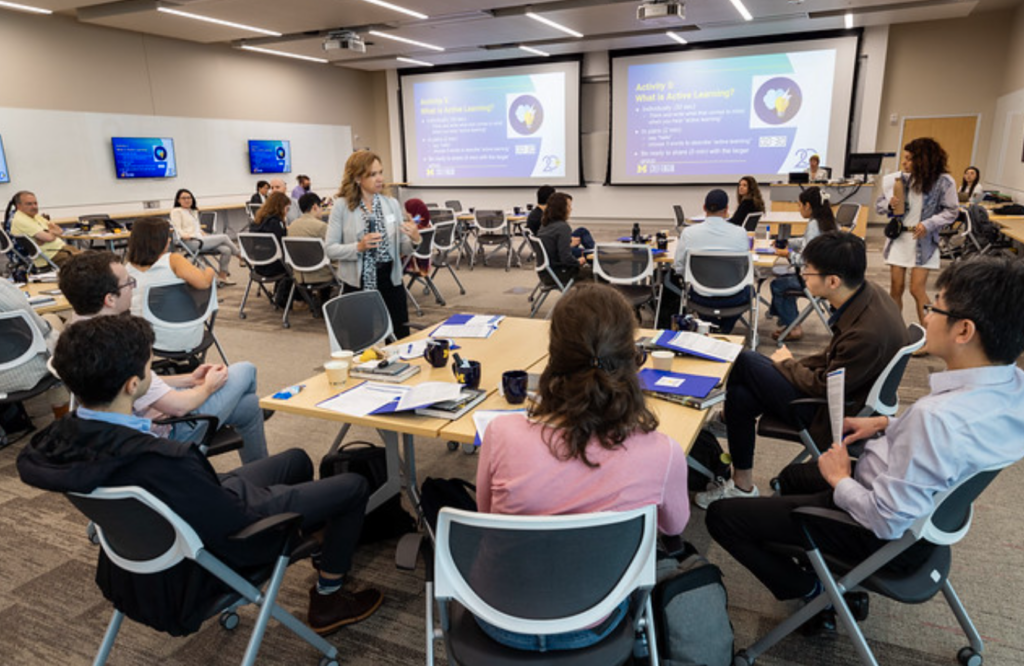
We were recently featured in Michigan Engineering News for two decades of supporting innovative engineering education! As part of our 20th year anniversary, we are encouraging folks who have interacted with us to help us celebrate this milestone by sharing their story.

To learn more about our center and read more about the services we offer, please visit our website!
Questions? [email protected]
